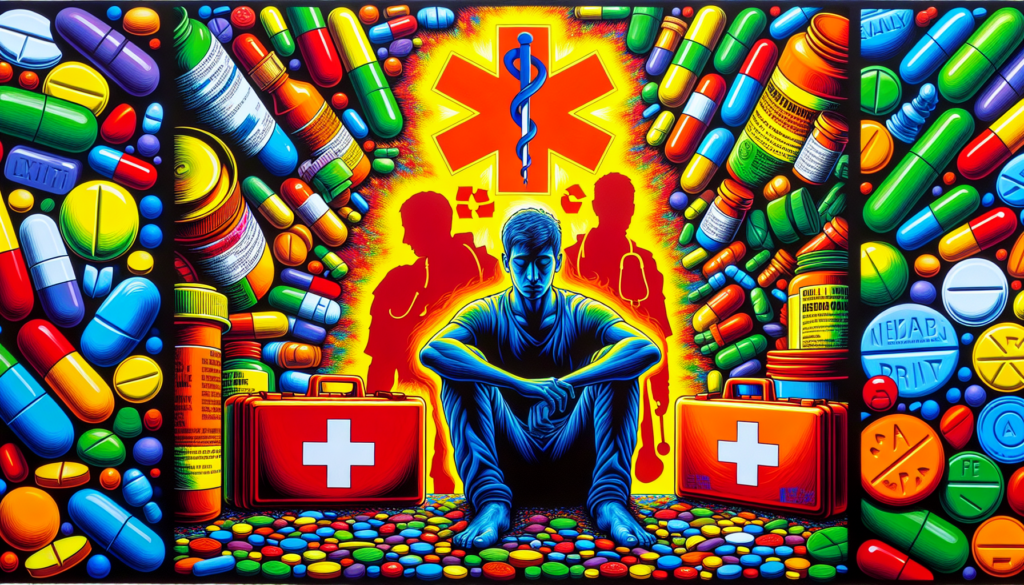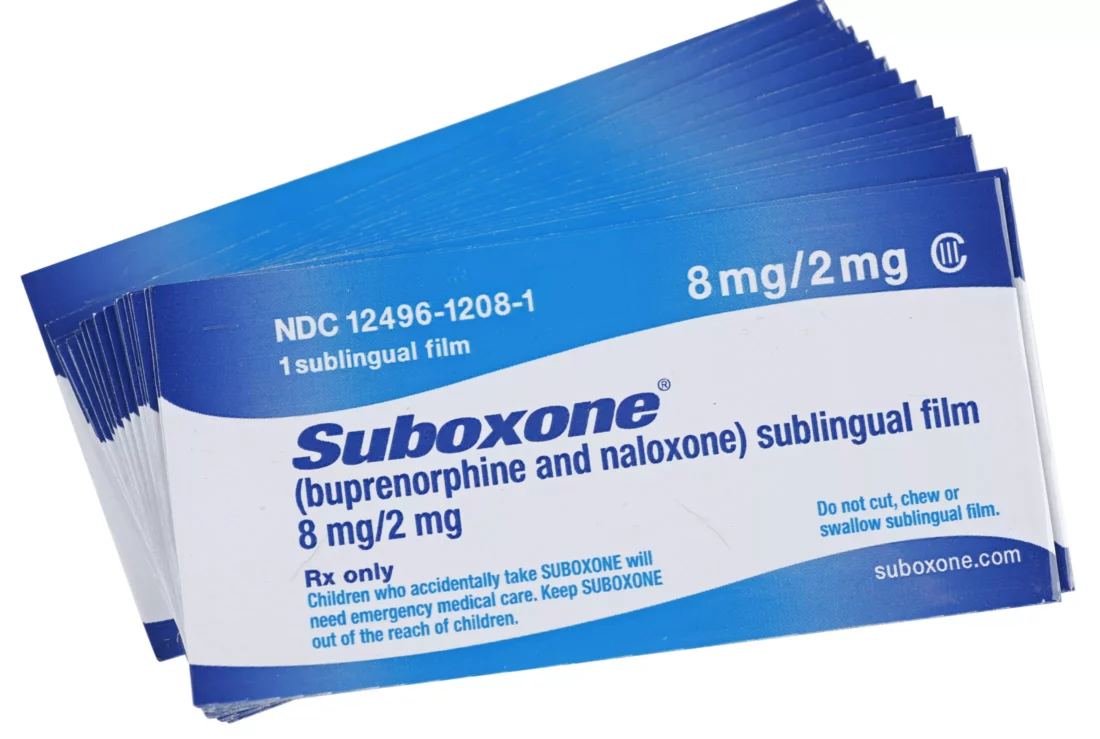Can you overdose on Suboxone? Yes, it’s possible, especially if it’s not taken as directed or mixed with other drugs. This article will explain the risks, symptoms of overdose, and tips for safer use.
Key Takeaways
- Overdose on Suboxone is rare but can occur, particularly when misused or combined with other central nervous system depressants.
- Understanding the symptoms of overdose, such as respiratory distress and extreme sedation, is critical for timely intervention and seeking emergency assistance.
- Factors increasing the risk of Suboxone overdose include low opioid tolerance and dangerous drug interactions, emphasizing the need for proper education and adherence to prescribed guidelines.
Can You Overdose on Suboxone? Key Facts and Safety Tips

If taken according to instructions, the likelihood of overdosing on Suboxone is low. Misuse or combining it with other drugs can be extremely dangerous. As a medication consisting of buprenorphine and naloxone, Suboxone aims to diminish overdose risks relative to fully activating opioids such as heroin. This is because buprenorphine serves as a partial agonist at opioid receptors—eliciting fewer effects like sedation and respiratory depression than full agonists would.
Combining Suboxone with depressants like benzodiazepines or alcohol amplifies its risk profile substantially by potentially inducing critical respiratory distress among other grave health issues. It should also be recognized that individuals possessing high opioid tolerance may encounter distinctive hazards compared to those less accustomed to opioids.
Incorporated within Suboxone’s formulation, naloxone acts as an antagonist when activated and blocks opioid receptors for some time—a measure intended for additional protection against overdose. Despite this safeguarding mechanism, misuse through injection circumvents these protective features and increases chances of an overdose scenario.
For users relying on Suboxane in their treatment plan, adherence to the prescribed usage guidelines remains essential due to the potential dangers associated with improper use.
Introduction
It is essential to comprehend the dangers linked to Suboxone during its utilization in treating opioid addiction. Those taking Suboxone must recognize that, while an overdose may be rarer than with other opioids, it remains a serious risk. Armed with this knowledge, individuals can adopt preventative strategies and seek immediate assistance when necessary.
The likelihood of experiencing a Suboxone overdose escalates in instances where one’s opioid tolerance is low or if they consume it alongside other substances or have specific health problems. Identifying these contributing elements and being able to detect signs of an overdose—including slowed breathing and pronounced drowsiness—is critical for safe medication use.
In cases where symptoms indicative of a Suboxone overdose appear, it’s imperative to obtain medical help without delay due to the rapid progression of such adverse effects.
Understanding Suboxone

Suboxone is formulated to address opioid addiction by incorporating a mix of two primary substances: buprenorphine and naloxone. Serving as a partial opioid agonist, buprenorphine allows Suboxone to stimulate the brain’s opioid receptors albeit with less intensity than full agonists like heroin or prescription opioids do. This feature aids in diminishing both cravings and withdrawal symptoms while not eliciting the high associated with greater abuse risk and potential for overdose.
Conversely, naloxone functions as an antagonist that competes with opioids for receptor sites, temporarily preventing their effects and capable of reversing them if necessary. The inclusion of naloxone helps deter misuse since its activation upon injection can dissuade individuals from abusing Suboxone.
Thanks to its sophisticated structure meant to prevent tampering along with its pharmacological characteristics, Suboxone provides those struggling with dependence on opioids a relatively safer therapeutic alternative during their recovery process.
Can an Overdose on Suboxone Occur?
It is possible to overdose on Suboxone, particularly when it is misused or mixed with other depressant substances. When taken with central nervous system depressants like benzodiazepines or alcohol, the risk of a potentially fatal respiratory depression increases significantly. Complications can arise from the use of drugs intended to treat Suboxone overdoses.
Those who have a low opioid tolerance or past struggles with opioid addiction are at higher risk for a Suboxone overdose. Despite naloxone being included in the medication as an anti-overdose agent, it cannot guarantee complete prevention of overdose risks — especially if individuals misuse Suboxone by consuming excessively high doses or mixing it with other drugs.
By adhering strictly to medical guidance and prescribed quantities of medication usage, these dangers can be greatly reduced. Patients must understand how crucial it is to recognize signs of an overdose and know that they should immediately seek professional medical intervention if they perceive any such indications.
Recognizing Symptoms of Suboxone Overdose

It’s essential to be able to identify the symptoms of a Suboxone overdose promptly for immediate action. Symptoms often observed are respiratory difficulty, where breathing becomes slow or insufficient. Other common indicators include extreme drowsiness and sedation, along with mental disorientation or confusion. Additional signs can consist of constricted pupils, lack of clear vision, and diminished alertness or complete unresponsiveness.
An opioid overdose can escalate to unconsciousness in its most critical phase and necessitates urgent medical care to avoid life-threatening consequences. Recognizing these warning signals early on enables swifter solicitation of medical help.
Informing both individuals taking opioids and their support network about these tell-tale symptoms ensures they are prepared to react quickly should an overdose take place. Rapid intervention greatly enhances recovery prospects and helps avert severe health complications.
Factors Increasing Suboxone Overdose Risk
There are numerous contributing factors that escalate the possibility of experiencing an overdose with Suboxone, and it is vital to be aware of these factors for safe usage. One significant contributor to this increased risk is possessing a low tolerance towards opioids, which can often result after not using them for a while. If individuals who have taken a break from opioid use then start retaking Suboxone, they may unintentionally consume more than their body can currently process, potentially resulting in an overdose.
The danger of overdosing on Suboxone rises substantially when combined with other substances such as alcohol or sedatives like benzodiazepines. Even seemingly harmless items such as grapefruit juice could amplify the levels of Suboxone in the blood circulation inadvertently causing enhanced effects and possibly toxic outcomes.
Those without previous exposure to opioids possess heightened sensitivity toward the impact of Suboxone and hence face greater risks associated with its use. Engaging in conversation about these concerns with healthcare professionals aids in reducing potential dangers associated with taking suboptimal doses or mixing medications unsafely during treatment involving opioid tolerance management through drugs like Suboxone.
Dangerous Drug Interactions with Suboxone
Suboxone has the potential for hazardous interactions with a variety of substances and medications. When mixed with Suboxone, benzodiazepines, alcohol, and prescription opioid pain relievers, they can cause profound respiratory depression and heightened drowsiness, elevating the risk of an overdose substantially.
Combining Suboxone with other opioids is fraught with danger due to their synergistic effects that increase overdose risks. The confluence of alcohol and Suboxone may also compromise cognitive functions while precipitating dangerously depressed respiration rates.
It’s important to be aware that even legitimate prescription medications could present hazards when taken concurrently with Suboxane. A dialogue between patients and healthcare providers regarding any additional drugs being consumed is essential in preventing life-threatening interactions. By recognizing these risky combinations, individuals can greatly mitigate their chances of experiencing an overdose.
How to Respond to a Suboxone Overdose
In the event of a suspected Suboxone overdose, it is imperative to consider it an urgent medical situation and promptly obtain help. While administering naloxone can temporarily counteract the overdose effects, securing subsequent emergency medical care is essential due to the fleeting duration of naloxone’s effectiveness.
Should you encounter someone who is unresponsive or not breathing, begin CPR immediately and continue until emergency responders arrive. The array of interventions that these professionals might employ encompasses methods such as using activated charcoal and providing intravenous fluids in order to address the overdose comprehensively.
Preventing Suboxone Overdose

To avoid an overdose of Suboxone, it’s essential to be well-informed about its proper use and the importance of sticking to the dosages prescribed by physicians. The medication is formulated in a way that deters abuse, particularly when used as instructed. By educating patients on the correct use of Suboxone and informing them of the dangers associated with improper use, we can substantially diminish the chances of overdosing.
Medical professionals highlight the necessity for patients to follow their prescription guidelines rigorously and steer clear of combining Suboxone with other substances that depress central nervous system activity. Consistent check-ins with healthcare providers are crucial for maintaining a treatment regime that is both safe and effective.
Managing Suboxone Addiction
Dealing with Suboxone addiction necessitates expert medical supervision, particularly when initiating treatment and during the dose-reduction phase. It is vital to vigilantly watch for indications of respiratory distress in the initial phase of buprenorphine therapy. Creating a supportive setting is critical for individuals facing withdrawal as it helps mitigate apprehension and bolsters adherence to their treatment regimens, given that they may contend with physical dependence.
Utilizing medications can be beneficial in lessening the discomfort of withdrawal symptoms, thereby facilitating a smoother detoxification experience. To prevent becoming addicted to Suboxone and optimize recovery outcomes, patients must follow their doctor’s dosing instructions carefully.
Research indicates that extending the duration of buprenorphine treatments results in more favorable long-term results for those struggling with opioid dependency.
Withdrawal Symptoms from Suboxone
Symptoms of withdrawal from Suboxone usually emerge within 72 hours following the final dose. Due to its distinct pharmacological characteristics, detoxifying from Suboxone is a process that can span several weeks and differs significantly compared to detoxification from other drugs.
To mitigate the intensity of withdrawal symptoms during detox, it is essential for individuals to be administered appropriate medications. The supervision by medical professionals is crucial in managing these symptoms effectively, enhancing comfort throughout the withdrawal phase, and reducing potential relapse risks.
Treatment Options for Suboxone Dependence
A number of medications are known to significantly diminish the use of opioid drugs and related disorders. These include methadone, buprenorphine, and naltrexone. When administered in high doses, buprenorphine has been seen to improve retention in treatment programs and reduce rates of relapse. A monthly injection form of naltrexone has shown promising results by increasing adherence over daily oral intake options as part of efforts to treat opioid addiction.
The integration of behavioral therapy with medication into an all-encompassing treatment strategy can amplify the recovery process while helping to prevent the misuse of opioids. Both buprenorphine and naltrexone display similar levels of effectiveness once individuals have started receiving treatment. Unlike buprenorphine that can be initiated earlier on during dependency management, initiating naltrexone requires patients first undergo complete detoxification from opioids.
Finding Suboxone Treatment Centers
It is essential to select an appropriate rehabilitation facility for successful recovery. American Addiction Centers offer high-quality services in addiction treatment across a multitude of facilities throughout the country. Northern Illinois Recovery also provides extensive care, specializing in treating addictions to substances such as heroin, Suboxone, and prescription opioids.
The range of services offered at these centers includes medical detoxification, therapeutic counseling, and sustained support designed to assist people in conquering their addictions and attaining enduring sobriety.
Summary
It’s imperative to be aware of the potential for a Suboxone overdose when employing this medication in the battle against opioid addiction. Identifying overdose signs, being knowledgeable about emergency responses, and implementing preventative strategies are key actions that can preserve life.
For those grappling with opioid dependency or watching someone close struggle, it is important to pursue expert assistance while faithfully following treatment protocols. Keep in mind that overcoming addiction is achievable and there exists ample support to assist you on this journey.
Frequently Asked Questions
Can you overdose on Suboxone?
Yes, an overdose on Suboxone can occur, particularly if misused or taken with other substances, despite it being unlikely when used as directed.
What are the symptoms of a Suboxone overdose?
If symptoms such as respiratory distress, sedation, decreased responsiveness, and pinpoint pupils are present, this may indicate a Suboxone overdose.
Immediate medical attention is essential when these signs occur.
How can I prevent a Suboxone overdose?
To prevent a Suboxone overdose, adhere strictly to prescribed dosages, avoid combining it with other central nervous system depressants, and maintain regular consultations with healthcare professionals.
These precautions are essential for your safety.
What should I do if someone overdoses on Suboxone?
If someone overdoses on Suboxone, promptly administer naloxone, start CPR if required, and seek emergency medical assistance immediately.
Quick action is crucial to ensure their safety.
Where can I find treatment for Suboxone addiction?
Facilities such as American Addiction Centers and Northern Illinois Recovery provide extensive services for treating opioid addiction, including Suboxone addiction.
By getting assistance from these specialized centers, you can greatly enhance the success of your recovery process.

Mitchell Grant Cohen
Dr. Mitchell G. Cohen is a board-certified Internal Medicine specialist with over 34 years of experience in patient-centered healthcare. A graduate of Hahnemann University School of Medicine, Dr. Cohen completed his internship at the University Health Center of Pittsburgh, where he gained invaluable hands-on experience. He is also a certified addiction specialist, holding membership with the American Society of Addiction Medicine (ASAM).
Currently based in Nashua, NH, Dr. Cohen is affiliated with Saint Joseph Hospital, where he provides comprehensive care focusing on both internal medicine and addiction treatment. His expertise includes prevention, diagnosis, and management of adult diseases, as well as specialized care for individuals facing substance use disorders.
Dr. Cohen is committed to fostering open communication, ensuring his patients are fully informed and empowered to make confident decisions about their health and treatment options.





